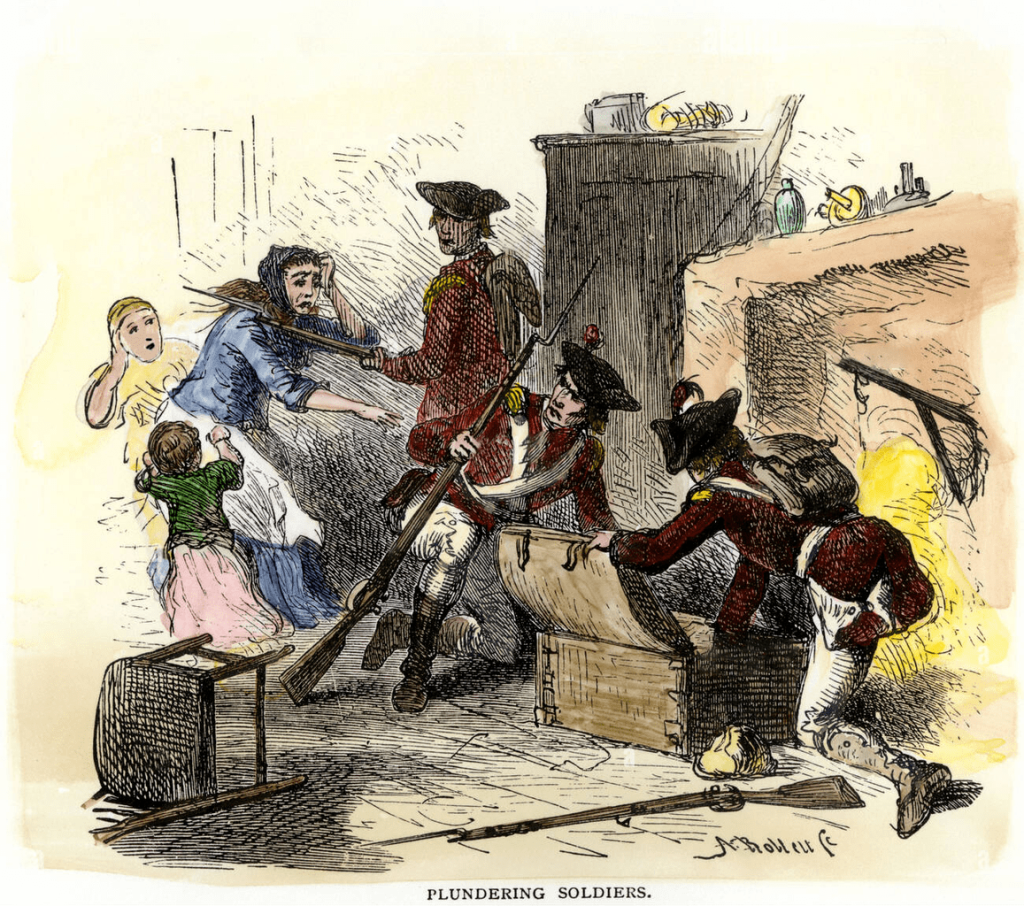
Edward A. St. Germain created AmericanRevolution.org in 1996. He was an avid historian with a keen interest in the Revolutionary War and American culture and society in the 18th century. On this website, he created and collated a huge collection of articles, images, and other media pertaining to the American Revolution. Edward was also a Vietnam veteran, and his investigative skills led to a career as a private detective in later life.
The Quartering Acts were a series of laws implemented by the British parliament. The laws stated that the Thirteen Colonies in America had to provide housing and other supplies to the British Army, free of charge.
On this page, we’ve summarized the Quartering Acts of 1765 and 1774, and explained their historical context. We’ve also discussed how people in the colonies reacted to the acts.
In 1763, the French and Indian War ended. This was a war fought in America between the British and French, with various Native American allies on each side of the conflict.
With the war won, the British affirmed their control of the Thirteen Colonies. However, the conflict was very expensive, due to the cost of maintaining the British Army in America.
Therefore, the British began making changes to taxation law in an attempt to raise revenue from their overseas territories, and repay the war debt.
The British still needed to raise revenue, and at the time, army officers complained that the cost of maintaining their forces in America was extremely high.
During the war, the colonists provided food and shelter to the British Army to help them defend their land, but after the war was won, most no longer felt the need to do so.
On May 15, 1765, the British parliament passed the Quartering Act. It stated:
In 1774, a new Quartering Act was implemented. The most notable change was that the colonists were now required to house British soldiers on private property in certain situations, which was not permitted under the 1765 version of the act.
The purpose of the Quartering Acts was twofold:

The colonists and their political representatives were outraged by the Quartering Acts.
After the French and Indian War, most people did not see the need to continue stationing large numbers of British soldiers in America.
While quartering measures were viewed as reasonable in wartime, the colonists did not see the continued need to provide free accommodation to the British Army. This, along with the introduction of new laws like the Stamp Act, led to increased hostility between the colonists and British government.
Colonial governments could not afford to provide housing and other supplies to British soldiers without affecting the quality of life of their citizens. After the war ended, most colonies’ economies were struggling, especially as the British began to implement other taxes, such as the Sugar Act.
In response to the Quartering Act of 1765, most colonies simply refused to comply with the law. When a fresh group of British troops arrived in New York in 1766, the governor refused to supply housing.
In response, the British imposed the New York Restraining Act in 1767, which prevented the New York colonial assembly from implementing any new laws until they began to comply with the Quartering Act.
Patriot politicians labeled the Quartering Act unconstitutional, given that it effectively bypassed local governments, directly enforcing demands upon the colonies without their consent. They thought this violated their rights as Englishmen, and was another case of taxation without representation, which they argued was illegal under British common law.
The other effect of the Quartering Act was it led to increased tensions between British soldiers and civilians. This arguably contributed to future instances of violence, such as the Boston Massacre of 1770.
![]()
Read the diary of Charles Herbet, a Continental soldier that was captured by the British Army and sent to a prison of war camp in the UK.
![]()
Read entries from 1781 in the journal of James Thatcher, Continental Army surgeon during the American Revolution.
![]()
Read entries from 1780 in the journal of James Thatcher, Continental Army surgeon during the American Revolution.